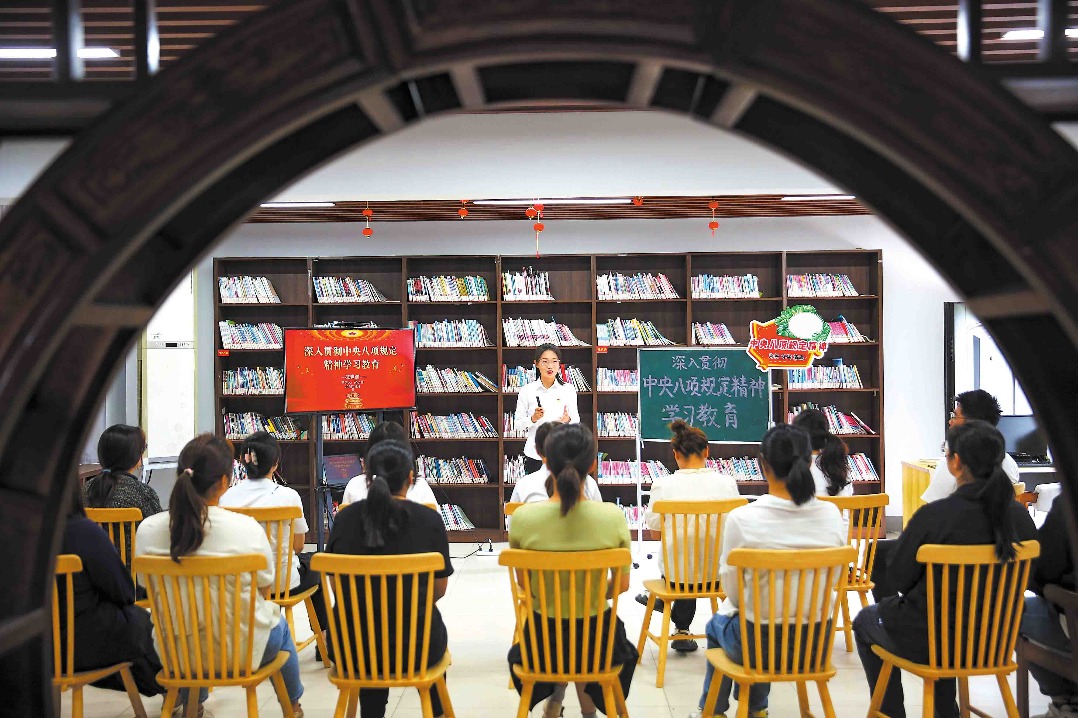Drifting into reality

 |
| Outside Tsinghua University's western gate in Beijing. Higher education |
A hollow feeling
Ye, from Shaoguan, sees himself as a school-drifter. He says the real world is different from his ideal.
He landed a job as a production assistant in a local jewelry company in March last year but quit two months later. "The 2,400-yuan salary was high among my classmates, but the job is too tiring. I have only one day off every week and the working hours are too irregular," he says.
"Entering society makes me feel hollow."
Not ready to take a job for now - he has some savings, loans from friends and an occasional job - Ye and the two school-drifters he lives with decided to try their luck on this year's post-graduate exam. Ye's goal is Jinan University in Guangzhou, where he failed to get in last year.
"I want to be a teacher in the future, so I have to pursue higher degrees."
Hu says most of the school-drifters aim to enter grad school after one or more years; some hope to find a better job; some want to stay in big cities; and some are simply fearful of the intensely competitive job market.
Living on school resources, Hu says, "is a way of cutting living costs. But they do have some resource conflict with currently enrolled students".
Universities are enrolling more students, resulting in crowded campuses, filled-up libraries and self-study classrooms, and dining halls as jammed as farmers markets. School-drifters add to that.
Hu also says, from his student management experience, that it is hard to trace school-drifters on campus. Universities are managed by departments, and it is unclear which departments should be responsible. "The fact is the schools now are pretty much neglecting the group," he says.
Why don't drifters return home? "From ancient times the Chinese have the notion that 'going out' and 'going to colleges' are good. Anybody coming back home without achievements is a loser," Hu says. "A too-high expectation from the parents could be a burden on the students, which blocked their way back home after graduation. Many would not tell parents back home their real situation."
In Ye's case, his mother died in 2009 and his father is essentially estranged. His married sisters occasionally support him, but they wanted him to get a job.
"They thought a bachelor's degree should be enough to get a decent job," Ye says.
Fewer job options
 |
| Wang Yingjie in her rented apartment near Minzu |
Based on Hu's research, school-drifters appeared as early as in the 1980s. The State still allocated jobs for college graduates then, but it wasn't enforceable: The graduate or the employer could decide not to sign the contract. If that happened, most of the unemployed graduates returned to their colleges and waited for the next round of allocation.
But there weren't many who did this, and they stayed on campus for just a few days.
An upsurge occurred in 1997, when the country launched the State-owned enterprises reform. Those enterprises had been the first choice of many career-starters, but they were hiring fewer graduates. Plus, the doorsills of foreign companies were still too high for fresh graduates, and private Chinese companies were still of low status.
As a result, many graduates felt lost, and the number who stayed in school - for further education, for better opportunity, or for the comfort level - increased.
By 2003, colleges graduated the first class of students under a State push to increase higher education rates. Add that to layoffs by State-owned companies and the usual flood of migrant workers, and a tight job market reached a new peak.
A State policy issued in March 2002 said unemployed graduates could keep their hukou (household registration) in the schools for two more years. And many did, drifting.
Unrealistic?
Hu lists score-oriented education as one cause of school-drifters, "It is not doing well in connecting with the real world".
Primary and middle school education makes good exam performance the only pursuit of students. Without fully realizing their interests when it comes to choosing majors, coupled with inflexible major transfers in college, many students are just stuck studying things they are not interested in, Hu says.
"Moreover, career education is not yet treated with high importance. Many just think it's not a big deal compared to academic education."
Ye from Shaoguan University agrees.
"I majored in administrative management as an undergrad. The courses are too theoretical and I often skipped classes. Finding a job is hard. Some of my classmates just work at a mall selling cell phones, making only 1,800 yuan a month," he says.
"We're not competitive enough in the job market, even worse than some vocational schools."
Students, however, should also take some responsibility, Hu says.
Many hope their first jobs will bring everything, and some unrealistically compare with their peers. Once unsatisfied, they look for ways out, and pursuing further studies becomes a popular option.
Statistics from the Ministry of Education show that the number of applications for the post-graduate exam in 2011 reached 1.5 million, a 7 percent annual increase. Competition was fierce, though; only about one in three will make the cut.
A higher degree is commonly believed to be bound to higher pay.
MyCos, a third-party education statistics consulting and evaluation agency, released a report in late October last year on the payment of Class 2011. Based on 20,829 interviews, the average monthly pay is 4,160 yuan for grad school graduates, 2,514 yuan for undergrads and 2,077 yuan for vocational school graduates.
The report also noted that those employed as early as October, for jobs they will begin after graduation in June, are more competitive and their wages are higher.
Today's Top News
- China's system contributes beyond nation
- Xi's article on unity, hard work to be published
- Xi urges full, rigorous CPC self-governance
- Grassroots Party units continue to play key role
- Global investors double down on Chinese assets
- FM's visit to Europe seen as boosting ties































